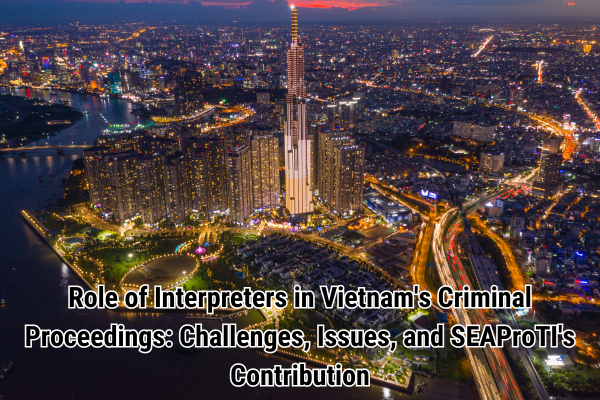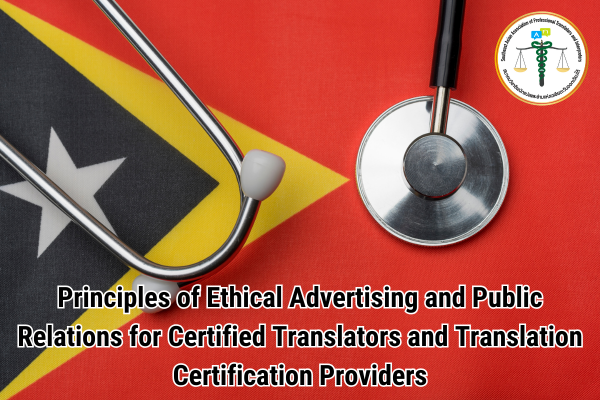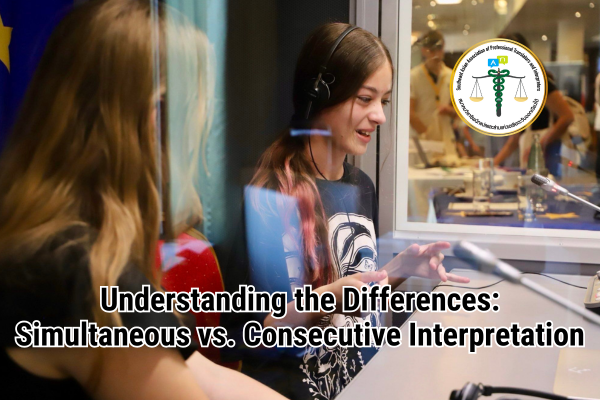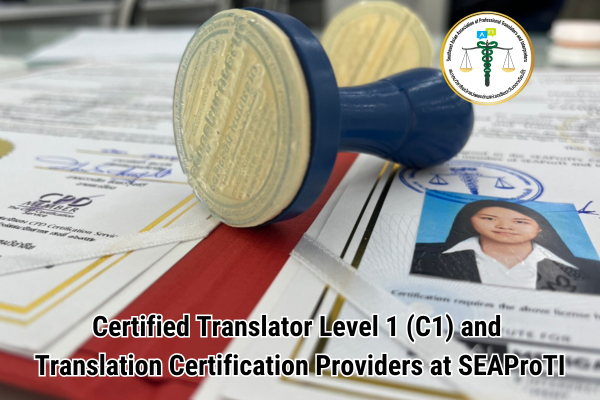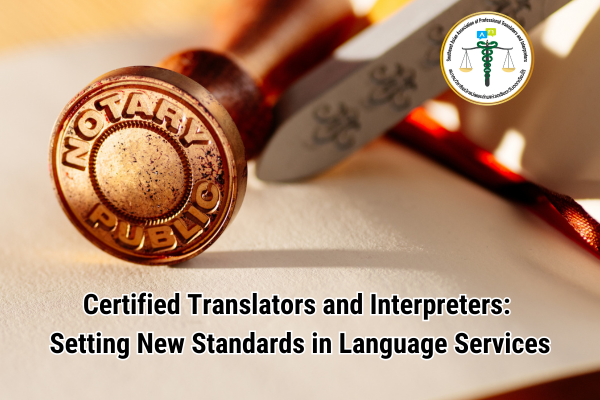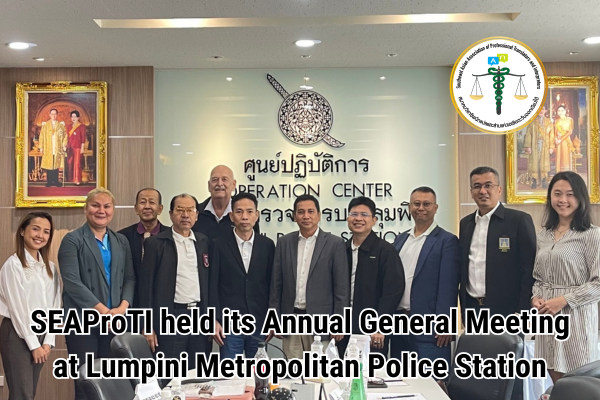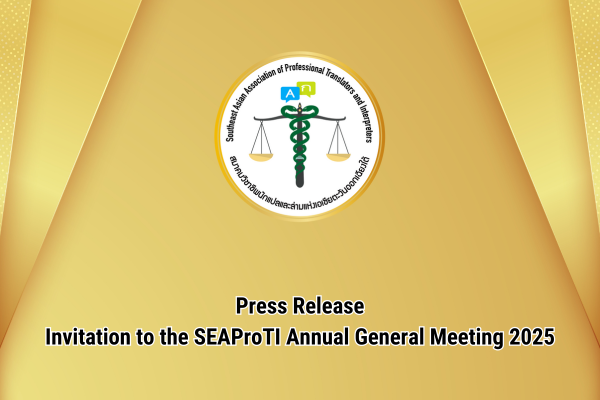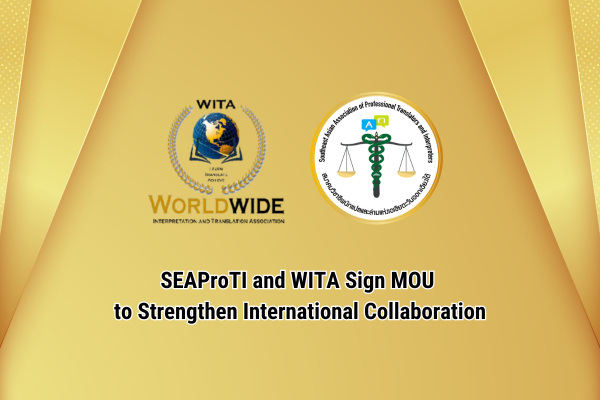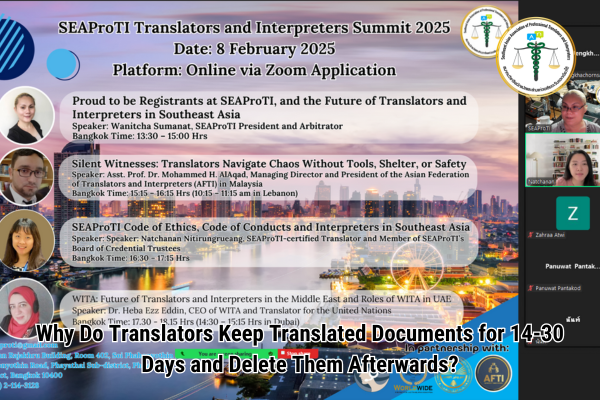The Role of Interpreters in Vietnam’s Criminal Proceedings:
Challenges, Issues, and SEAProTI’s Contribution
Interpreters play a crucial role in ensuring fairness and upholding human rights in criminal cases involving foreign suspects in Vietnam. However, the current system faces numerous challenges and issues that must be addressed to improve efficiency and transparency. This article explores these challenges, identifies key problems, proposes solutions, and highlights the significant role of the Southeast Asian Association of Professional Translators and Interpreters (SEAProTI) in enhancing Vietnam’s interpretation system.
Challenges in the Use of Interpreters in Criminal Proceedings
1. Lack of Qualifications and Training
Interpreters in Vietnam’s criminal proceedings are often sourced from provincial police departments or immigration offices. These individuals may lack proper legal training, making it difficult for them to accurately convey complex legal terminology. While they may handle general communication effectively, the absence of specialized training can lead to misunderstandings that affect suspects’ comprehension of charges and their legal rights.
2. Language and Cultural Complexity
Foreign suspects may come from countries with multiple official languages or have a native language different from the country’s official language. This creates additional barriers to effective communication. Moreover, cultural differences further complicate the interpretation of legal content in a way that aligns with Vietnam’s legal context.
3. Time and Resource Constraints
The urgency of criminal proceedings often necessitates quick access to qualified interpreters, but Vietnam faces resource limitations. The lack of readily available, high-quality interpreters can delay proceedings and undermine the credibility of the justice system.
Key Issues in the Use of Interpreters
1. Inaccurate or Incomplete Translations
Untrained interpreters may mistranslate statements or questions, leading to misunderstandings of charges and legal processes. This can result in inconsistent testimonies, which might harm the fairness of proceedings.
2. Impact on Credibility of Proceedings
Errors in interpretation can cause delays or necessitate retrials, undermining the efficiency and reliability of Vietnam’s justice system. Poor-quality interpretation reflects negatively on the overall credibility of the judicial process.
3. Lack of Legal Support for Interpreters
Vietnam’s criminal procedure law does not clearly define the qualifications or requirements for interpreters, resulting in inconsistent practices across different cases. This lack of standardization contributes to inefficiencies and gaps in the justice system.
Proposed Solutions
1. Establishing Standards for Interpreters
- Introduce clear qualifications for interpreters, including language proficiency, legal knowledge, and relevant experience.
- Implement comprehensive training programs to enhance interpreters’ understanding of legal terminology and procedures.
2. Translation of Legal Documents
Important legal documents, such as summons, investigation summaries, and judgments, should be translated into a language the suspect understands. This ensures transparency and prevents misunderstandings.
3. Creating a Database of Professional Interpreters
Develop a centralized database of certified interpreters to allow quick and efficient access to qualified professionals for criminal proceedings.
4. Enhancing International Cooperation
Forge agreements with other countries to facilitate the use of interpreters in cases involving foreign suspects. These partnerships can also include sharing resources and expertise to improve interpretation services.
The Role of SEAProTI in Supporting the Development of Interpreter Systems
The Southeast Asian Association of Professional Translators and Interpreters (SEAProTI) can play a pivotal role in supporting Vietnam’s efforts to enhance its interpretation system:
1. Providing Training and Certification
SEAProTI can organize training programs focusing on legal knowledge and interpretation skills. Certified interpreters will bring professionalism and reliability to Vietnam’s criminal justice system.
2. Building a Regional Interpreter Network
Establishing a regional network of interpreters allows resource sharing in complex cases involving multiple countries or rare language combinations.
3. Promoting International Standards
SEAProTI can help Vietnam align its interpretation practices with international standards, boosting the credibility of its justice system.
4. Raising Awareness
Through campaigns and events, SEAProTI can highlight the importance of quality interpretation in legal proceedings, fostering public and institutional recognition of this critical issue.
Conclusion
Developing a robust interpretation system is essential for improving the efficiency and transparency of Vietnam’s criminal justice system. Addressing interpreter-related issues requires collaboration among all stakeholders, with SEAProTI playing a key role in setting new standards. These reforms will not only enhance fairness within the system but also build trust and confidence in Vietnam’s judicial process at both the national and international levels.
SEAProTI’s certified translators, translation certification providers, and certified interpreters:
The Southeast Asian Association of Professional Translators and Interpreters (SEAProTI) has officially announced the criteria and qualifications for individuals to register as “Certified Translators,” “Translation Certification Providers,” and “Certified Interpreters” under the association’s regulations. These guidelines are detailed in Sections 9 and 10 of the Royal Thai Government Gazette, issued by the Secretariat of the Cabinet under the Office of the Prime Minister of the Kingdom of Thailand, dated July 25, 2024, Volume 141, Part 66 Ng, Page 100.
To read the full publication, visit: the Royal Thai Government Gazette
ระบบล่ามในคดีอาญาในเวียดนาม: ความท้าทาย ปัญหา และบทบาทของ SEAProTI ในการแก้ไข
การใช้ล่ามในคดีอาญาที่เกี่ยวข้องกับผู้ต้องสงสัยชาวต่างชาติในเวียดนามมีความสำคัญต่อการสร้างความเป็นธรรมและปฏิบัติตามหลักสิทธิมนุษยชน อย่างไรก็ตาม ระบบนี้ยังเผชิญกับความท้าทายและปัญหาหลายประการที่จำเป็นต้องได้รับการแก้ไขเพื่อเพิ่มประสิทธิภาพและความโปร่งใส บทความนี้จะอธิบายถึงความท้าทาย ปัญหา แนวทางในการปรับปรุง และบทบาทสำคัญของสมาคมนักแปลและล่ามมืออาชีพแห่งเอเชียตะวันออกเฉียงใต้ (SEAProTI) ในการสนับสนุนการพัฒนาระบบล่ามในเวียดนาม
ความท้าทายของการใช้ล่ามในคดีอาญา
1. การขาดคุณสมบัติและการฝึกอบรม
ล่ามที่ใช้ในกระบวนการพิจารณาคดีอาญาในเวียดนามมักมาจากหน่วยงานตำรวจระดับจังหวัดหรือหน่วยงานตรวจคนเข้าเมือง ซึ่งบุคคลเหล่านี้อาจไม่ได้รับการฝึกอบรมทางกฎหมายที่เหมาะสม แม้ว่าล่ามจะสามารถสื่อสารในระดับทั่วไปได้ดี แต่เมื่อเผชิญกับคำศัพท์ทางกฎหมายที่ซับซ้อน ความผิดพลาดในการแปลอาจเกิดขึ้น ซึ่งส่งผลกระทบต่อความเข้าใจของผู้ต้องสงสัยเกี่ยวกับข้อกล่าวหาและสิทธิของตนเอง
2. ความซับซ้อนทางภาษาและวัฒนธรรม
ผู้ต้องสงสัยชาวต่างชาติที่มาจากประเทศที่มีภาษาราชการหลายภาษา หรือมีภาษาแม่ที่แตกต่างจากภาษาราชการ อาจเพิ่มความยากลำบากในการสื่อสารและทำความเข้าใจข้อเท็จจริงของคดี นอกจากนี้ ความแตกต่างทางวัฒนธรรมยังอาจสร้างอุปสรรคในการแปลเนื้อหาที่สอดคล้องกับบริบททางกฎหมายของเวียดนาม
3. ข้อจำกัดด้านเวลาและทรัพยากร
การจัดหาล่ามที่มีคุณภาพในช่วงเวลาที่เร่งด่วนเป็นความท้าทายสำคัญ เนื่องจากกระบวนการพิจารณาคดีอาญามักต้องการล่ามที่สามารถแปลได้อย่างถูกต้องและทันท่วงที การขาดทรัพยากรที่เพียงพอทำให้กระบวนการล่าช้าและอาจส่งผลกระทบต่อความน่าเชื่อถือของระบบยุติธรรม
ปัญหาของการใช้ล่ามในคดีอาญา
1. การแปลผิดพลาดและไม่ครบถ้วน
ล่ามที่ขาดความเชี่ยวชาญด้านกฎหมายอาจแปลข้อความหรือคำถามผิดพลาด ทำให้ผู้ต้องสงสัยเข้าใจผิดเกี่ยวกับข้อกล่าวหาและสิทธิของตนเอง การแปลที่ไม่ถูกต้องยังสามารถนำไปสู่การให้การที่ไม่สอดคล้องกันในกระบวนการพิจารณาคดี
2. ผลกระทบต่อความน่าเชื่อถือของกระบวนการ
ความผิดพลาดในการแปลอาจส่งผลให้เกิดความล่าช้าในกระบวนการพิจารณาคดี หรือแม้กระทั่งการยื่นอุทธรณ์หรือการพิจารณาคดีใหม่ในอนาคต ความล้มเหลวในการจัดหาล่ามที่มีคุณภาพอาจบั่นทอนความน่าเชื่อถือของระบบยุติธรรมในเวียดนาม
3. ขาดการสนับสนุนจากกฎหมาย
กฎหมายวิธีพิจารณาความอาญาของเวียดนามยังไม่มีบทบัญญัติที่ชัดเจนเกี่ยวกับเกณฑ์คุณสมบัติหรือข้อกำหนดในการคัดเลือกและฝึกอบรมล่าม ซึ่งทำให้เกิดความไม่สอดคล้องกันในการใช้ล่ามในคดีอาญา
แนวทางในการแก้ไขปัญหา
1. กำหนดมาตรฐานสำหรับล่าม
-
ออกข้อกำหนดเกี่ยวกับคุณสมบัติของล่ามที่ใช้ในคดีอาญา เช่น ความสามารถทางภาษา ความรู้ด้านกฎหมาย และประสบการณ์การแปล
-
จัดการฝึกอบรมล่ามเพื่อเพิ่มพูนความรู้ด้านกฎหมายและทักษะการแปลที่เกี่ยวข้องกับกระบวนการพิจารณาคดีอาญา
2. การแปลเอกสารทางกฎหมาย
เอกสารสำคัญ เช่น หมายเรียก ข้อสรุปการสอบสวน และคำพิพากษา ควรได้รับการแปลเป็นภาษาที่ผู้ต้องสงสัยเข้าใจ เพื่อป้องกันความเข้าใจผิดและเพิ่มความโปร่งใสในกระบวนการ
3. จัดตั้งฐานข้อมูลล่ามมืออาชีพ
สร้างฐานข้อมูลล่ามที่ผ่านการรับรอง เพื่อให้หน่วยงานที่เกี่ยวข้องสามารถเข้าถึงล่ามที่มีคุณภาพได้อย่างรวดเร็วและมีประสิทธิภาพ
4. เพิ่มความร่วมมือระหว่างประเทศ
ทำข้อตกลงความร่วมมือกับประเทศอื่น ๆ เพื่อสนับสนุนการใช้ล่ามในคดีที่เกี่ยวข้องกับผู้ต้องสงสัยจากต่างประเทศ รวมถึงการแลกเปลี่ยนความรู้และทรัพยากรที่เกี่ยวข้อง
บทบาทของ SEAProTI ในการสนับสนุนการพัฒนาระบบล่าม
สมาคมนักแปลและล่ามมืออาชีพแห่งเอเชียตะวันออกเฉียงใต้ (SEAProTI) สามารถมีบทบาทสำคัญในการสนับสนุนการพัฒนาระบบล่ามในเวียดนาม:
-
จัดอบรมและรับรองล่ามมืออาชีพ SEAProTI สามารถจัดโปรแกรมการฝึกอบรมล่ามที่เน้นความรู้ด้านกฎหมายและการแปลที่มีคุณภาพสูง พร้อมมอบใบรับรองให้กับล่ามที่ผ่านมาตรฐาน
-
สร้างเครือข่ายล่ามในภูมิภาค การสร้างเครือข่ายล่ามในเอเชียตะวันออกเฉียงใต้ช่วยให้สามารถแลกเปลี่ยนล่ามในกรณีที่ซับซ้อนหรือเกี่ยวข้องกับหลายประเทศ
-
ผลักดันมาตรฐานระดับสากล SEAProTI สามารถช่วยผลักดันมาตรฐานการใช้ล่ามในกระบวนการพิจารณาคดีให้สอดคล้องกับแนวทางสากล เพื่อยกระดับความน่าเชื่อถือของระบบยุติธรรมในเวียดนาม
-
สร้างความตระหนักรู้ SEAProTI สามารถช่วยรณรงค์สร้างความเข้าใจถึงความสำคัญของการใช้ล่ามที่มีคุณภาพในกระบวนการพิจารณาคดีผ่านโครงการและกิจกรรมต่าง ๆ
สรุป
การพัฒนาระบบล่ามในคดีอาญาในเวียดนามเป็นสิ่งสำคัญในการเพิ่มประสิทธิภาพและความโปร่งใสของกระบวนการยุติธรรม การแก้ไขปัญหาที่เกี่ยวข้องกับล่ามต้องอาศัยความร่วมมือจากทุกภาคส่วน รวมถึงการสนับสนุนจากองค์กรระดับภูมิภาคอย่าง SEAProTI ซึ่งมีบทบาทสำคัญในการยกระดับมาตรฐานการใช้ล่ามในคดีอาญา การเปลี่ยนแปลงดังกล่าวไม่เพียงแต่จะช่วยให้ระบบยุติธรรมมีความเป็นธรรมมากขึ้น แต่ยังเสริมสร้างความเชื่อมั่นในกระบวนการยุติธรรมของเวียดนามทั้งในระดับประเทศและนานาชาติอีกด้วย
เกี่ยวกับนักแปลรับรอง ผู้รับรองการแปล และล่ามรับรองของสมาคมวิชาชีพนักแปลและล่ามแห่งเอเชียตะวันออกเฉียงใต้
สมาคมวิชาชีพนักแปลและล่ามแห่งเอเชียตะวันออกเฉียงใต้ (SEAProTI) ได้ประกาศหลักเกณฑ์และคุณสมบัติผู้ที่ขึ้นทะเบียนเป็น “นักแปลรับรอง (Certified Translators) และผู้รับรองการแปล (Translation Certification Providers) และล่ามรับรอง (Certified Interpreters)” ของสมาคม หมวดที่ 9 และหมวดที่ 10 ในราชกิจจานุเบกษา ของสำนักเลขาธิการคณะรัฐมนตรี ในสำนักนายกรัฐมนตรี แห่งราชอาณาจักรไทย ลงวันที่ 25 ก.ค. 2567 เล่มที่ 141 ตอนที่ 66 ง หน้า 100 อ่านฉบับเต็มได้ที่: นักแปลรับรอง ผู้รับรองการแปล และล่ามรับรอง


